How did Afghanistan’s security forces lose the war?
The US spent billions of dollars building and training Afghan security forces, and yet it resulted in failure – why, asks Susannah George, did this happen?

Your support helps us to tell the story
From reproductive rights to climate change to Big Tech, The Independent is on the ground when the story is developing. Whether it's investigating the financials of Elon Musk's pro-Trump PAC or producing our latest documentary, 'The A Word', which shines a light on the American women fighting for reproductive rights, we know how important it is to parse out the facts from the messaging.
At such a critical moment in US history, we need reporters on the ground. Your donation allows us to keep sending journalists to speak to both sides of the story.
The Independent is trusted by Americans across the entire political spectrum. And unlike many other quality news outlets, we choose not to lock Americans out of our reporting and analysis with paywalls. We believe quality journalism should be available to everyone, paid for by those who can afford it.
Your support makes all the difference.Building Afghanistan’s national security forces was one of the most ambitious and expensive aspects of two decades of US-led war.
It resulted in failure.
The United States spent billions of dollars training and equipping police, soldiers and special forces. Despite years of warnings from US and Afghan officials, successive US administrations pledged that the Afghan military was capable of defending the country. President Joe Biden said it was “as well-equipped as any army in the world” just a month before its collapse.
Today, not a single unit of the country’s security forces remains intact.
A sophisticated Taliban campaign aimed at securing surrender deals lay at the heart of the Afghan military’s collapse, but layers of corruption, waste and logistical failures left the country’s security forces so underequipped and with such battered morale that it enabled the militants’ success.
Interviews with more than a dozen members of the Afghan special forces, army and police in three provinces from May to July illustrate that the collapse of security forces was not abrupt. Instead, it was a slow, painful breakdown that began months before the fall of Kabul.
Early May, Kabul
Death stalked Afghanistan’s security forces in the spring. As the pace of the US withdrawal increased, and the Taliban continued its relentless sweep through rural Afghanistan, casualties among government fighters surged.
The last time Niazi’s family spoke to him was during a hurried phone call. The Afghan national army soldier, who goes by one name, was stationed at a remote outpost in Baghlan province.
“He told me he was fine,” said his mother, Bas Bigum. But she could sense from his voice that he feared for his life. “We know what happens when the Taliban surrounds a base.”
As the war intensified, many of Afghanistan’s police on the front line were entering their sixth month without pay
Niazi’s Afghan army unit was attacked inside its own base after being surrounded by Taliban fighters. The unit’s commander fled.
Niazi was injured in the subsequent battle, and he later died of his wounds at a Kabul hospital.
The family never received formal condolences from the country’s military, nor did the Defence Ministry help cover the funeral costs.
May, Kandahar province
As the war intensified, many of Afghanistan’s police on the front line were entering their sixth month without pay, a widespread problem that took a toll on government forces’ morale and made them vulnerable to Taliban offers.
At a small outpost south of Kandahar city, Noor Ahmad Zhargi was on guard duty. The Eid holiday marking the end of Ramadan was approaching and even if he was granted leave, he said he wouldn’t go home.
“I would be too ashamed to look at my children with empty hands,” he said.
When he joined Afghanistan’s police force, all he was given was a gun – no training or documentation.
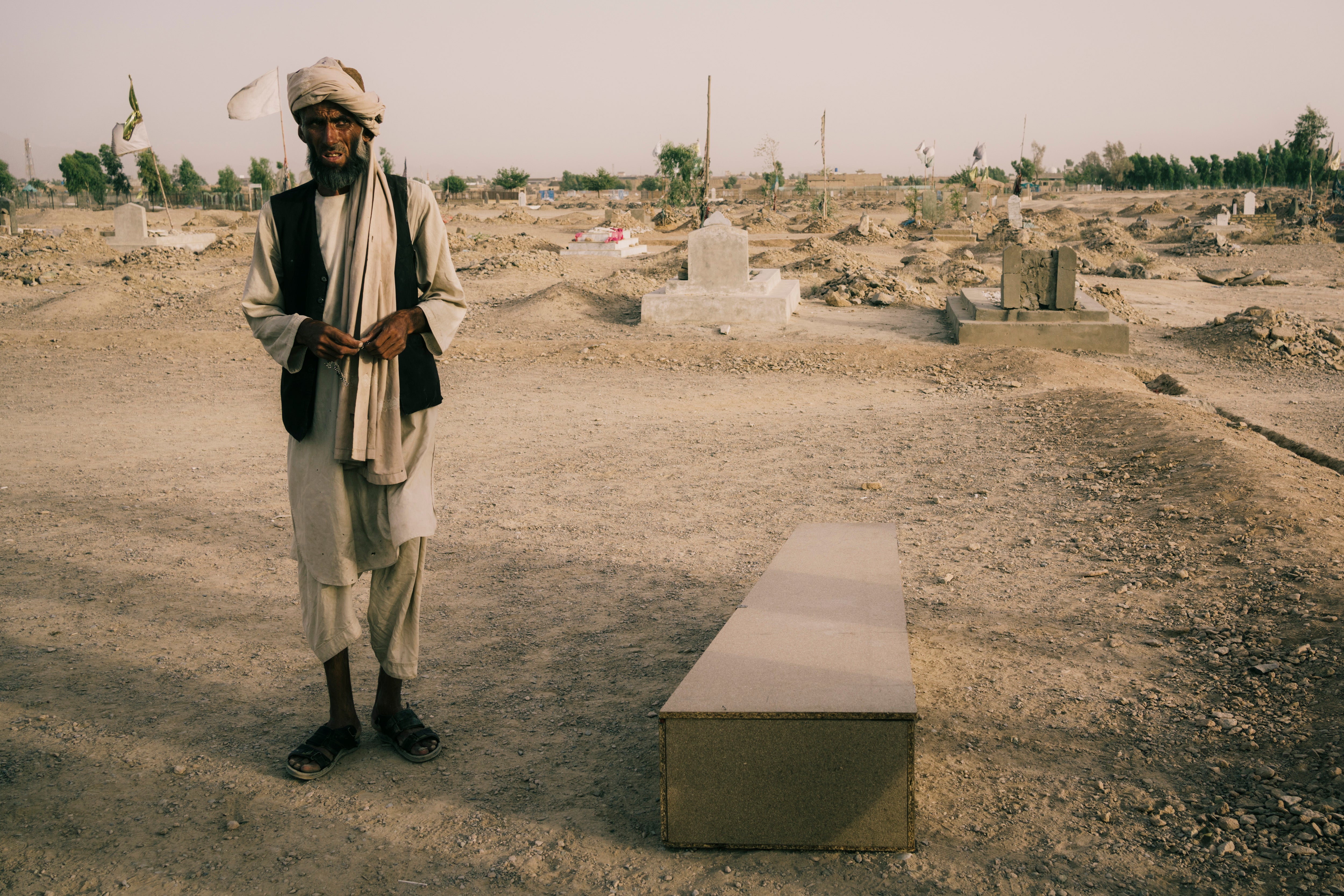
“Next month, if the government doesn’t pay me, maybe I should just sell this to the Taliban,” he said, holding the rifle. He said he had heard the Taliban was paying about $2,000 (£1,500) for Afghan government weapons like his, a price much higher than the market rate. He insisted he would never join the Taliban but dodged a question about whether he would surrender.
Two months later, Zhargi’s post had fallen to the Taliban, along with nearly every other district in Kandahar, except for the provincial capital. Other police in the city said they heard everyone at the post had surrendered, and many were taken by the militants. No one knew if they were still being held as prisoners or had been executed.
Afghanistan’s most highly trained fighters were assigned to defensive operations as the Taliban pushed closer to provincial capitals and as US air support disappeared. Elite fighters were tasked with running dangerous resupply missions that made them susceptible to Taliban ambushes.
“This is not what we were trained to do,” said Lt Abdul Hamid Barakzai of the Afghan commandos, referring to the drives between outposts where Taliban fighters often placed snipers or roadside bombs. He said the commandos were given the task because they were one of the few units with heavily armoured vehicles.
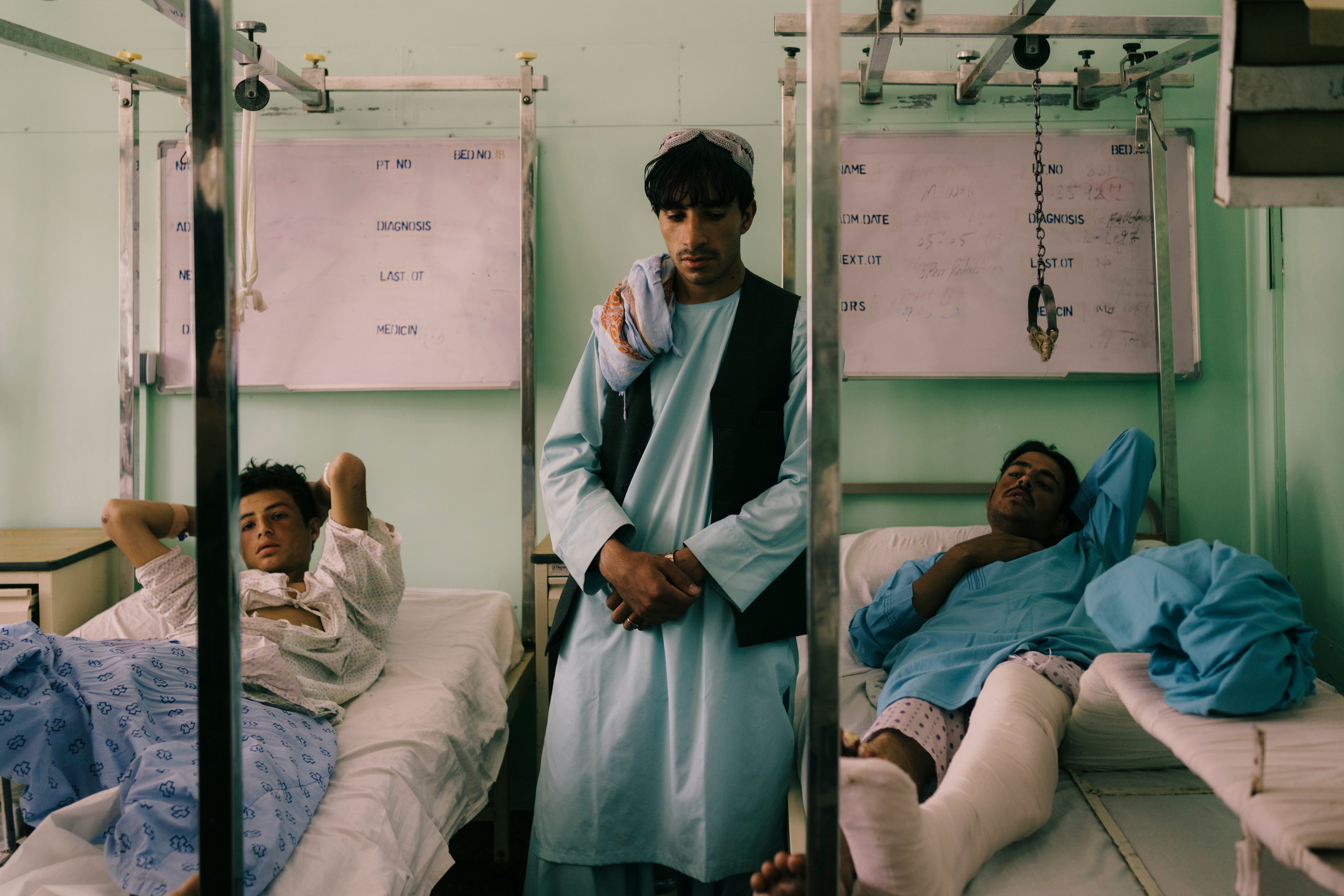
As one team arrived at a small maze-like base to drop off bread and energy drinks, a Taliban sniper round ricocheted off the side of a heavily armoured vehicle, sending shrapnel into the stomach of one of the soldiers. He quickly wrapped a scarf around the wound and brushed it off. “They shoot at us like this every day,” one of the other men said.
The Taliban snipers were also proving deadly. At one base, the guard on duty stepped outside to take a phone call and was shot and killed instantly. At another, a policeman returning from patrol was shot through the heart.
Security forces were also being targeted inside Kandahar city.
Shakila’s husband – a policeman – began receiving threatening letters from the Taliban two months before he was gunned down in the city’s central bazaar.
“I was always begging him, you don’t need to continue this job, it’s too dangerous,” she said. But her husband, Mohammad Sadiq Nabizada, couldn’t find other work.
July, Kunduz province
By July, the Afghan government had lost control of large swaths of the country and was relying on elite units – the best trained, equipped and generally most motivated – to lead the fight.
But without US oversight, the troops were being mismanaged and overworked.
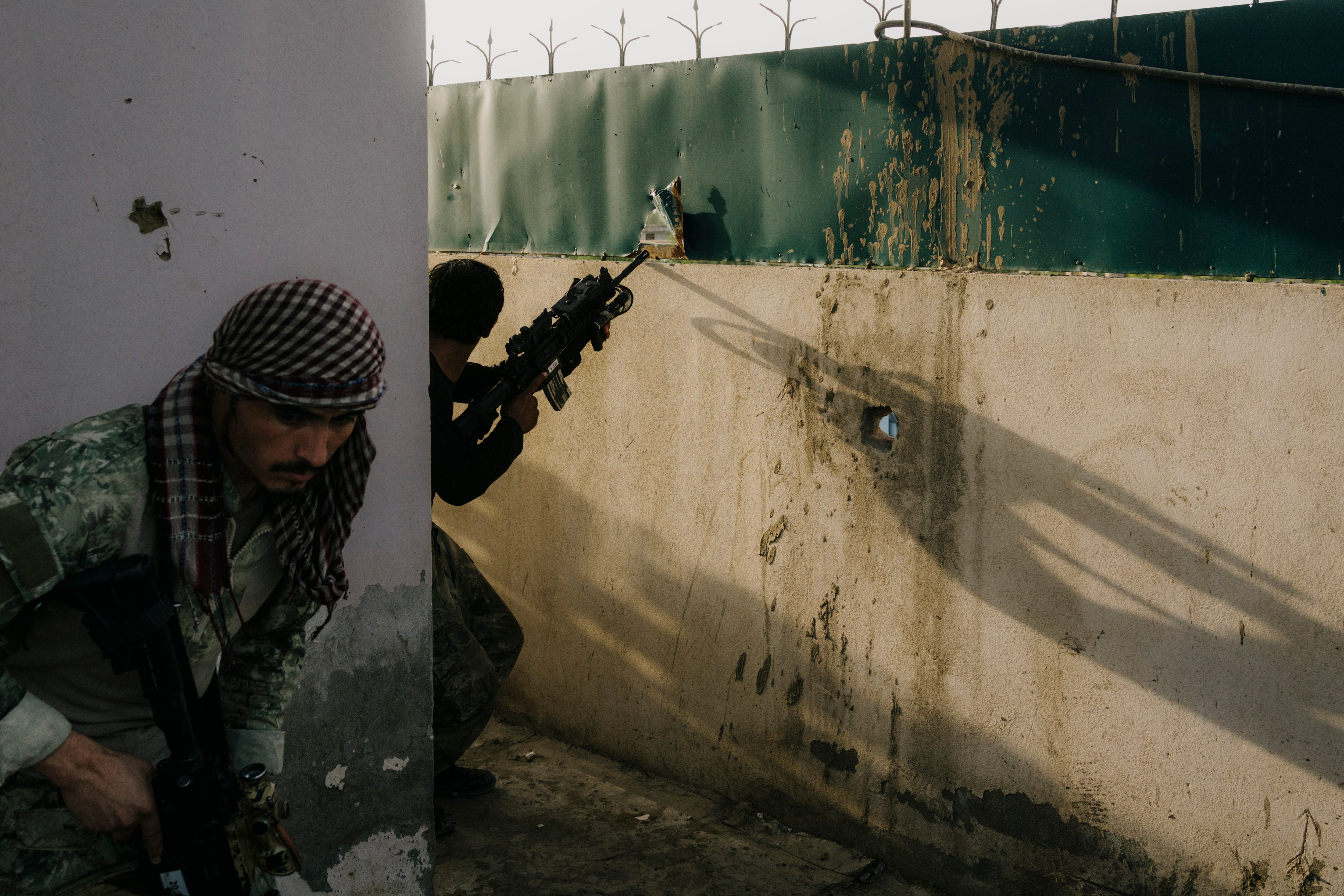
“We knew how to defeat the Taliban, but the leadership at the top didn’t listen,” said a captain in one of Afghanistan’s most elite units. He spoke on the condition of anonymity because he was not authorised to speak to the press.
As the United States withdrew its forces, Afghanistan special operators were largely moved under the command of the Defence Ministry. The shift robbed the units of a degree of independence that had insulated them from the corruption that handicapped other branches of the country’s security forces, the captain said.
He said he presented his supervisor with multiple plans to reorganise the country’s security forces and to push back the militants’ advances. But each time he was rebuffed.
“Instead, we were sent to conduct clearing operations with no support,” he said. “That is not how you win a war. We were letting the enemy choose the battle space; we should have been taking the fight to them.”
The captain admitted that the men in his unit were also struggling to operate without US coordination and air support. There was never an effort to wean the units off American backing, and so many suddenly found themselves without tools they had relied on for years to conduct even simple operations, the captain said. Two other Afghan special forces officers confirmed his account.
As one special forces unit in Kunduz prepared to go on leave, its commander confided that he feared many of his men wouldn’t return to their next rotation.
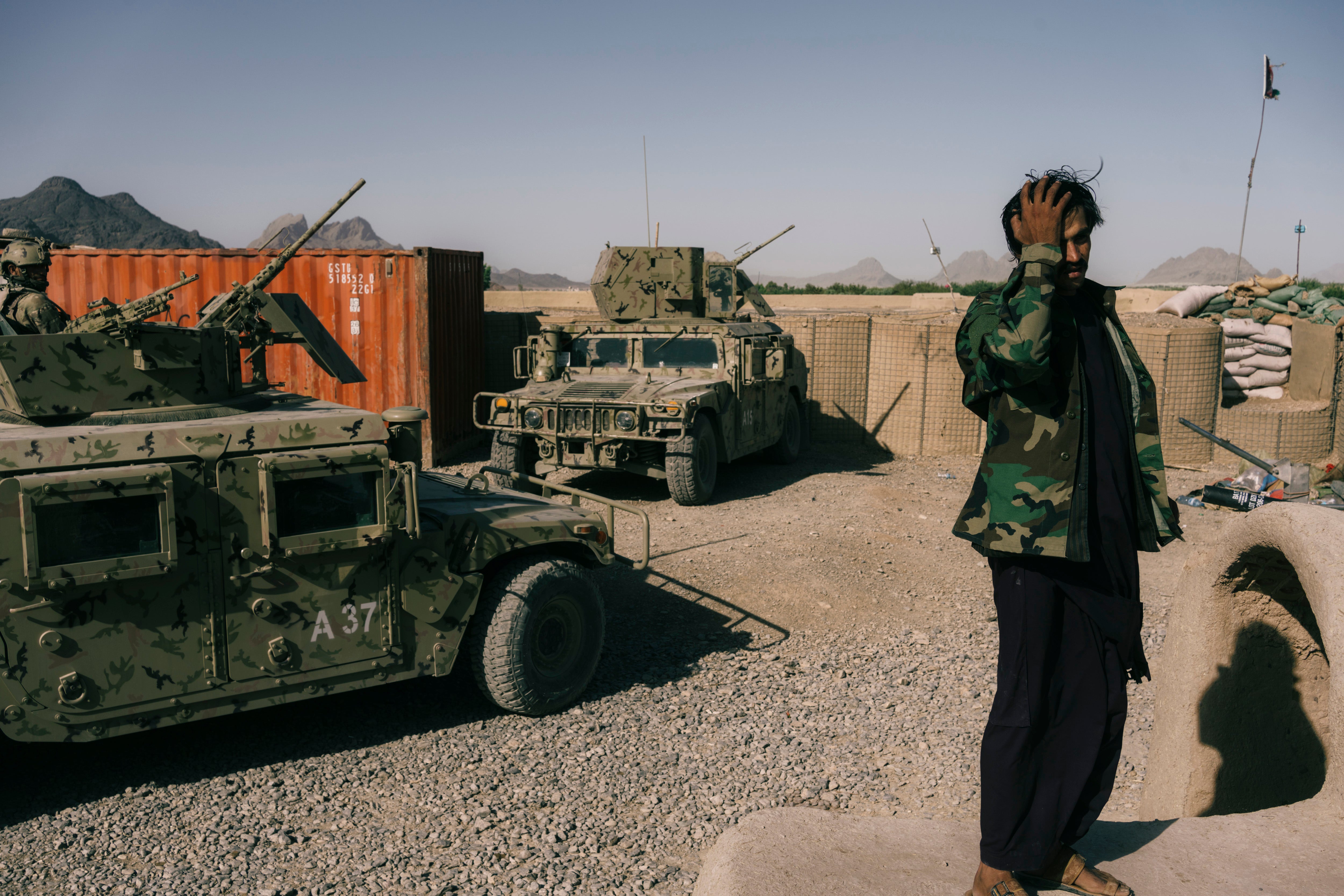
“My guys are tired,” he said of the four-month rotation of near-daily front-line combat. He also spoke on the condition of anonymity because he was not authorised to speak to the press. “And we are tired of this nonsense.” Defence Ministry bureaucracy was also beginning to cripple operations. Well-planned missions would be changed or cancelled at the last minute and support forces would not appear or would disregard orders.
“If I take 100 of my guys on my own, we can defend my village from the Taliban,” the captain said, “but with the Defence Ministry, we can’t do anything.” Weeks before Kabul fell, he said he was considering leaving his position to start up a militia in his hometown.
“There are plenty of men who want to fight,” he said. “It’s the leadership that is holding them back.”
Both the special forces commander in Kunduz and the captain fled Afghanistan on US evacuation flights with their families. The captain said he still hopes to return to resist the Taliban.
July, Kandahar
By late July, the Taliban was closing in on nearly all the country’s provincial capitals. Afghan security forces that hadn’t been killed by the Taliban had deserted or repeatedly fled, steadily retreating from remote outposts into city centres.
Those who remained on the country’s front lines were some of the least capable.
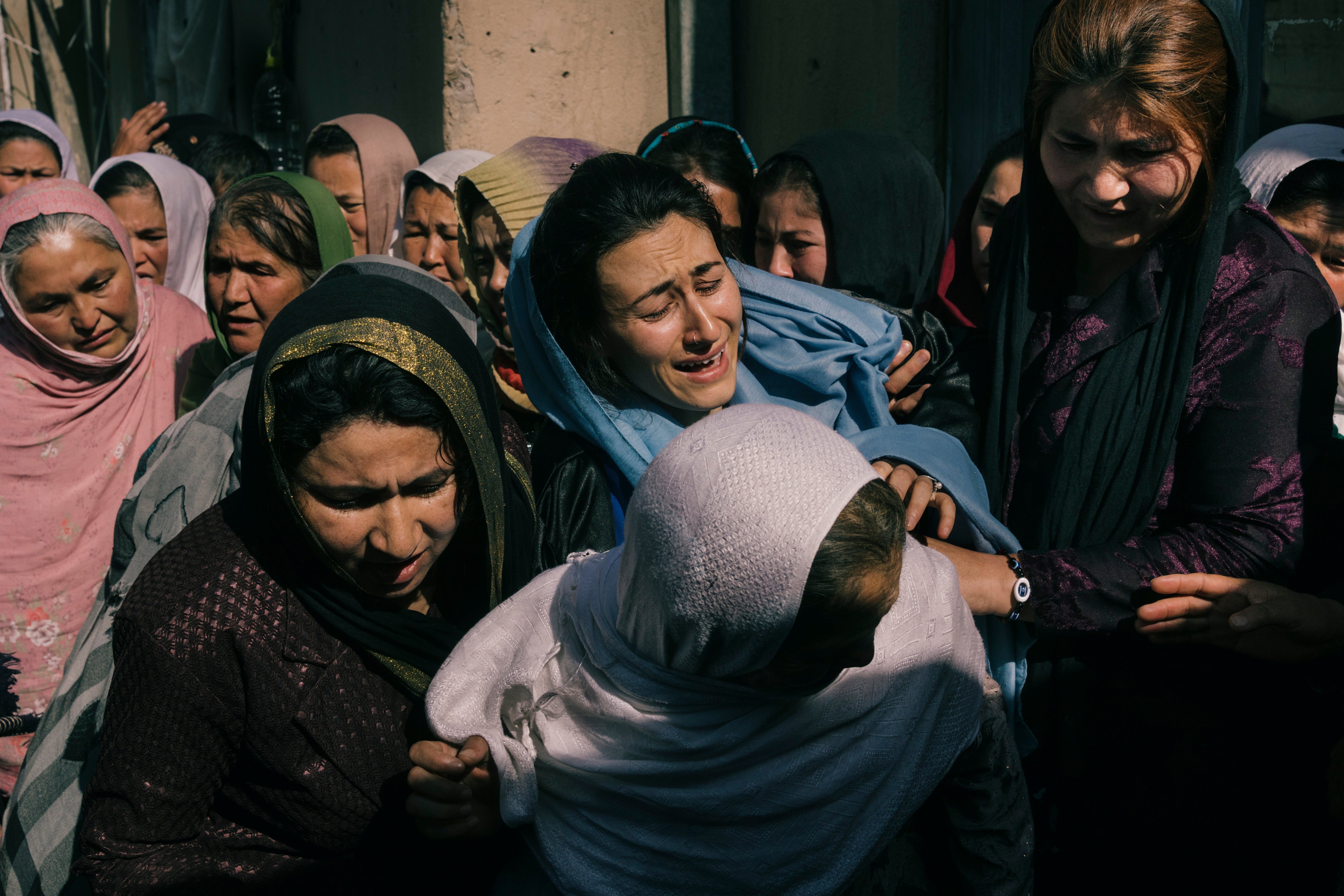
“The Taliban are everywhere now, even inside the city,” said Obidullah Bilal, a wounded policeman in Kandahar’s central hospital. He was driving an unarmored police truck through eastern Kandahar to resupply a checkpoint when he was caught by a Taliban ambush.
“It’s because of our leadership that we are in this position,” he said, referring to the massive territorial losses the government had suffered in a matter of weeks. “Our leaders sell our checkpoints. They’ve already sold our blood.”
One police commander said the only men from his unit willing to hold positions against the Taliban were drug addicts.
“It keeps them awake,” said Mirza Wali, a police commander attending the funeral for one of his men, Nik Mohammad, who had been killed by the Taliban ambush the night before.
Mohammad was estranged from his family because of his meth addiction, but his sister and mother, Taj Bibi, attended the funeral. They both sat in the shade of a truck a few metres from where Mohammad’s coffin was being covered with earth.
“The addicts are the only ones who can stand being on the front line,” Wali said. “If they weren’t using drugs, they would go crazy.”
© The Washington Post




Join our commenting forum
Join thought-provoking conversations, follow other Independent readers and see their replies
Comments